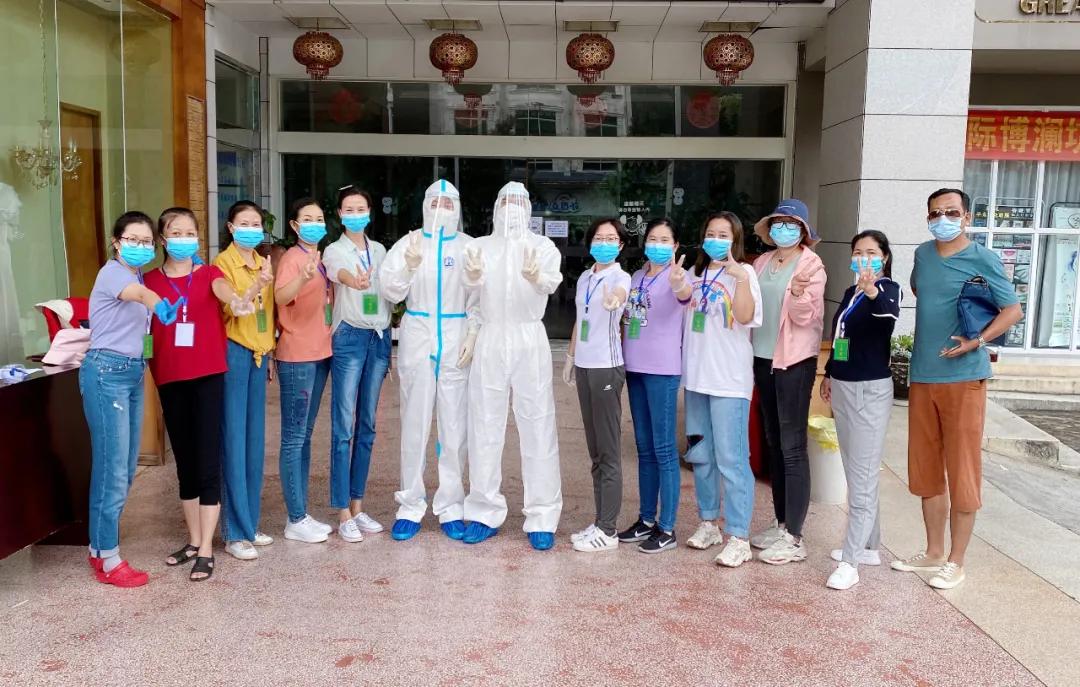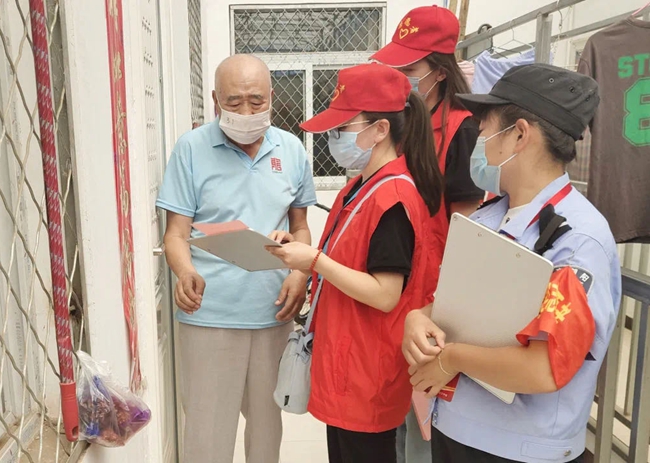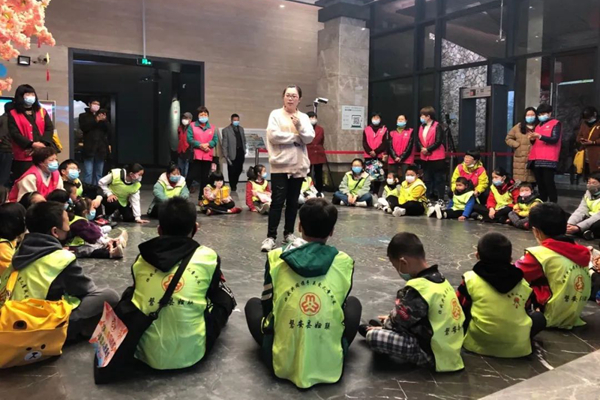
Academician Commits to Guaranteeing Safety of Pregnant Women, Unborn amid Anti-Epidemic Battle
Qiao Jie, President of Peking University Third Hospital, has been engaged in protecting the safety of pregnant women and their unborn babies since she went to the frontline to combat the novel coronavirus (COVID-19) in Wuhan, the epicenter of the outbreak and the capital of Central China's Hubei Province.
Preventing Vertical Transmission amid Fight Against COVID-19
Qiao, 56, also an academician with the Chinese Academy of Engineering, led a team of medical workers with Peking University Third Hospital to leave for Wuhan for aiding the epidemic prevention and control efforts there on February 1.
Their mission was to set up intensive care wards for virus-infected patients in critical conditions and do their utmost to increase the recovery rate and reduce fatalities.
As an obstetrician and gynecologist, Qiao is doubly concerned about the possibility of vertical transmission from mothers to their unborn babies amid the COVID-19 outbreak.
Speaking in an interview with CCTV (China Central Television), Qiao explained that she still cannot give a judgment over the possibility of vertical transmissions connected with the COVID-19 from the limited cases available right now. Instead, she advised pregnant women to remain calm, follow recommended tips such as washing their hands frequently, wearing facial masks when going out, reducing outdoor activities, and consulting gynaecological doctors through online platforms under current conditions.
During a visit to Zhongnan Hospital of Wuhan University, Qiao, also President of the China Medical Women's Association, expressed her thanks to female medical workers fighting on the frontline of the battle against the epidemic, encouraged them to devote themselves wholeheartedly in the prevention and control efforts, and urged them to strengthen self-protection.
In addition, she also went to delivery rooms at the hospital, extended deep respect to medical workers staying at their post, gave her best regards to pregnant women and new mothers there, and called on them to stand firm together in the anti-epidemic battle.
Helping Couples Realize Dream of Having a Child
"It is a natural dream for all couples to have a healthy baby. However, the incidence of infertility, birth defects and many other unexpected problems has thrown some of them into deep panic," said Qiao. She continued that her mission is to help women get pregnant and eventually give birth to healthy children in a simple yet safe way.
Many years ago, a couple visited Qiao and said that they wanted to have another baby with in-vitro fertilization technology. One of them suffered from single-gene inheritance disease that had passed on to their first child.
Under the support of assisted reproductive technology services, the female patient got pregnant but later a regular medical screening showed that the fetus was liable to suffer from birth defects.
Learning the news, Qiao immediately found the couple and explained the worse-case scenario to them. They fully understood what it would probably bring to them but yet insisted in delivering the baby.
Fortunately, the baby was very healthy.
Qiao noted that the case has made her to be resolved in overcoming challenges and learning more about reproductive health science in the years to come.
Statistics show that as of December 2019, Qiao and her team had received the visits of nearly 600,000 patients with infertility from home and abroad, conducted over 30,000 operations related to assisted reproductive technology, and helped many people have their own children.
Always Being Prepared to Embrace New Challenges
Qiao was enrolled in former Peking Medical University (the Health Science Center of Peking University) in 1981. Six years later, she continued her postgraduate study majoring in obstetrics and gynaecology after she received an internship in the department. She made up her mind to study polycystic ovary syndrome, a leading cause of infertility marked by chronic lack of ovulation, when she was still a postgraduate student with her academic supervisor in university.
Qiao found work at Peking University Third Hospital after she graduated from the university in 1990. She quickly showed her talent and competence in clinical and scientific research. She was lucky enough to be a member of the team led by Zhang Lizhu, a top domestic gynecologist and a leading doctor of test tube baby research in China. Zhang brought the first test-tube baby in the Chinese mainland to the world in 1988.
Inspired by the example set by Zhang, Qiao has always been prepared to rise up to challenges at the workplace every day.
According to Qiao, the past three decades have witnessed a remarkable development of China's assisted reproductive technology, which has annually helped over 10,000 couples have their own children.
Moreover, she has also focused herself on the concept of precision medicine, which take into account individual differences in people's genes, environments and lifestyles before giving more targeted and effective treatment plans of their illnesses.
Bringing More Wellbeing to the Public
Qiao has developed a habit of talking with her colleagues in the department of reproductive health about difficult and complicated cases they have encountered when she arrives at the hospital every morning.
Moreover, she will go back again to the department of reproductive health and hold discussions with students over their scientific research when others are preparing to return to their home after finishing a whole-day work.
As a team leader, Qiao has always done her utmost to harness the functions of her teammates since the strength of any individual is limited.
Meanwhile, she has made an integrated development of her clinical research, academic instruction and scientific studies over the past three decades.
Qiao has been closely involved in the promotion of popular science and the organization of technical training for grassroots doctors because the prevention of infertility is bearing much more importance than the intervention of advanced science and technology when it comes to pregnancy. Qiao also emphasizes the role of medical workers at the grassroots level since they have played a vital role in the early diagnosis and timely treatment of reproductive diseases in her eyes.
These days, many parents often contact Qiao to send her videos and photos of their healthy babies in expression of their deep gratitude to her for assisting them in the process of conception.
According to Qiao, the trust of patients has been the engine that supports her decade-long struggle. In turn, she has been working hard on delivering more wellbeing to the whole society.
(Women of China)
- Women Workers and Volunteers Contribute to Citywide Nucleic Acid Test in Qingdao
 Ruili Women's Federation in Yunnan Joins Anti-COVID-19 Epidemic Battle
Ruili Women's Federation in Yunnan Joins Anti-COVID-19 Epidemic Battle Chaoyang Women's Federation in Beijing Makes All-Out Efforts in Fight Against Virus
Chaoyang Women's Federation in Beijing Makes All-Out Efforts in Fight Against Virus- Women's Federations in C China's Hubei Help Women's Enterprises Resume Work
- County Heads, Women's Federations' Presidents Promote Agricultural Products via Livestreaming Shows
 Medic's Stories About Anti-Virus Fight Inspire Left-Behind Children at Women's Federation's Activity
Medic's Stories About Anti-Virus Fight Inspire Left-Behind Children at Women's Federation's Activity

 京公网安备 11010102004314号
京公网安备 11010102004314号